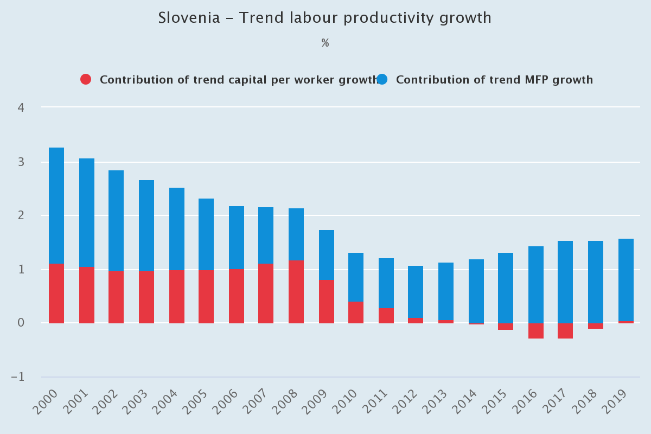Productivity Profile of Slovenia
 Organisations
Organisations
Institute of Macroeconomic Analysis and Development: The Institute of Macroeconomic Analysis and Development (IMAD) is an independent government office with a long tradition. Its Director answers directly to the President of Slovenia. In April 2018, the Slovenian Government extended the scope of the Institute’s work to include the functions of “National Productivity Board”. The Institute conducts analysis of productivity and competitiveness developments in Slovenia and prepares annual productivity reports.
Managers’ Association of Slovenia: The association has been supporting the development of management in Slovenia for more than 30 years. By conducting research in the productivity domain, it aims at co-creating the growth of competitiveness in the Slovenian economy and helps to shape the Slovenian society.
Ministry of Economic Development and Technology: The Ministry of Economic Development and Technology provides the support necessary to further strengthen the international competitiveness of Slovenian companies and change the composition of the Slovenian business sector so that it is adapted to the requirements of the global economy to the greatest possible extent. Through various measures, it provides a stable, predictable, and competitive economic environment for the growth and development of Slovenian companies in Slovenian and foreign markets.
 Selected Publications
Selected Publications
IMAD: Productivity Reports (multiple), Analysis of Slovenian companies’ performance, by activity (2020);
Managers' Association of Slovenia: An Action Plan for Higher Productivity Growth (2020), Outlook (2019)
OECD: Economic Surveys Slovenia (multiple).
 Data
Data

Click here to access our Compare-Your-Country tool and explore productivity data from the GFP member countries.

 Latest OECD Recommendations
Latest OECD Recommendations
Supporting the digital transformation of the economy:
- Continue privatisation efforts, particularly in inherently competitive sectors such as tourism, and strengthen the corporate governance of State-Owned Enterprises.
- Make the tax system more growth-friendly by further reducing labour taxes, and increasing consumption and property taxes.
- Promote digitalisation in the financial sector through evaluating the regulatory burden, and a closer alignment of FinTech regulations with other European countries.
- Align investment subsidies to reflect actual broadband deployment costs, particularly in underserved areas.
- Introduce input and output benchmarking in program management to evaluate effectiveness.
- Expand apprenticeships into technical programmes.
- Encourage wage-setting at the firm level and determine framework conditions, such as seniority bonuses and minimum wages at the sectoral level.
Related Documents

